Share
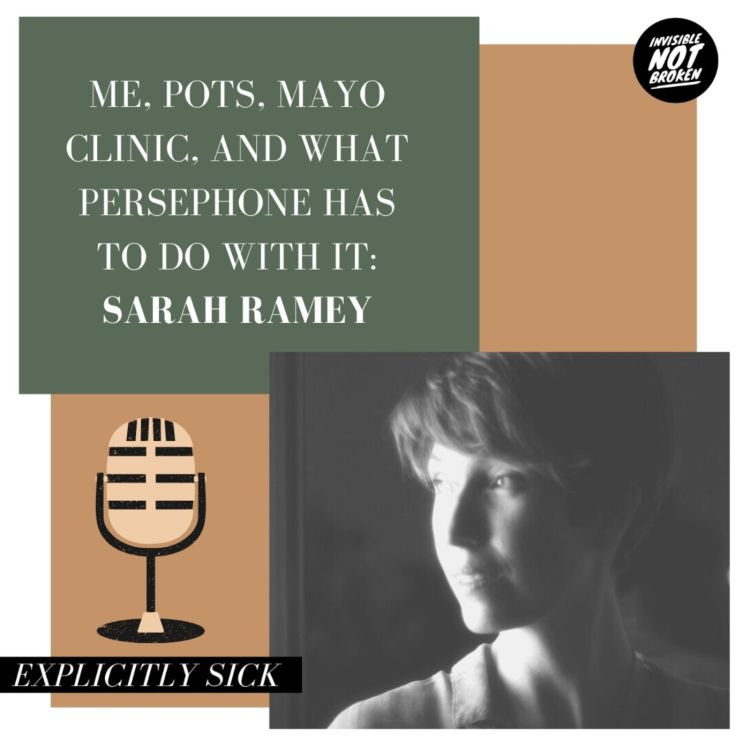
Invisible Not Broken - Chronic Illness Podcast Network
(Explicitly Sick) ME, POTS, Mayo Clinic, and What Persephone Has To Do With It: Sarah Ramey - Part 2
SARAH MARIE RAMEY
Email address *
sarahmarieramey@gmail.com
Website/Blog, Twitter, & Instagram Handle
www.sarahmarieramey.com @sarahmarieramey and @wolflarsenmusic for both
Name *
Sarah Ramey
What is your disorder? *
Hoo boy. What isn't my disorder? We can limit it to ME/CFS, complex regional pain syndrome (CRPS), and postural orthostatic tachycardia syndrome (POTS). Vulvodynia, a neurogenic bowel, mast cell activation syndrome (MCAS) too. You can just say the first three if you prefer - it starts to sound like reading the alphabet.
At what age did your disorder become a daily issue? *
22
Who were you before your illness became debilitating? *
I was incredibly active. At the time I got sick I was directing the college musical, the head of the women's a cappella group, the singer in a loud rock band, and a senior in college.
What would you do if you were not dealing with your disorder and/or disability? *
You know, I recently read through a journal from my senior year of college - and all I wanted to become was a musician and a writer. So despite it all, I somehow managed to stay on track there. I actually think it's quite likely I would have been pulled *off* track if I had not become sick, just because making money as an artist is such a challenge - and in my case, since I was stuck at home all the time, writing and music were some of the only options. However, as so many have suggested, this is not some sort of cosmic gift or rebalancing. I would give up being a writer and a musician in the blink of an eye if I could just have my health back. And indeed, sick people shouldn't have to choose. Being sick is not like wishing on a monkey's paw and getting what you always wanted, but at terrible a cost. I reject this, and think we should be working to understand these disease so that we can return health to the these patients, *so that* they can pursue their dreams fully. That's a long-winded way of saying: I would be doing music and writing, but in a much more active, and outward way. I would tour, I would play live, I would do book fairs and publicity events, and teach, and lecture - all things that are 90% not available to me in my current state (though I can do a little, and a little is much more than nothing).
What would you like people to know about your daily life? *
My daily life is what a normal person would consider a hellscape - filled with extreme pain, both abdominal, spinal, and vagina, and long periods of extreme exhaustion, heart problems, and brain fog. I have an ileostomy, which means I have an external bag for my own poop, and have to empty that 6-10 times a day. The pelvic pain is constant and excruciating. But, and this is the point, this is a *major improvement*. I used to be nearly comatose all day long with severe ME/CFS, with my mother propping me up to feed me soup. The pain used to be even worse than it is now. And before we diverted my colon, I was spending about 8 hours stuck in the bathroom every single morning and early afternoon, and couldn't leave the house - ever - until about 2 or 3 pm, like a vampire. So compared to that, I feel like I am actually doing quite well! I can leave the house in the mornings, I'm not stuck on a toilet all day, and the fatigue - while very bad for a normal person - is nowhere near as bad as it gets that the severe end of the spectrum. Hellish for a Normal, Not Half Bad for me.
What would make living and moving in the world easier for you? *
Never having to explain that I am actually sick just because I look fine. All kinds of people with very serious illnesses look fine, and they have but to say, "I have stage 4 cancer," and the entire world knows to respond seriously. I have never, not once in my life, told anyone I have ME/CFS and had the response be "Oh no, I am so sorry to hear that." Never! That is extraordinary and devastating.
Do you have any life hacks? *
I batch everything - I batch meals and make 4x as much as I need so that I have food for a while. I batch work, and have chunks of time set aside for email, for most important task of the day, for social media, and for reaching out to my friends and family. When I get away from batching, especially with work, I just feel constantly overwhelmed.
What kind of support do you get from family or friends? *
At this point, I have a lot of friends who check in on me, and my parents are extremely supportive. It's important to note: this was not always the case. This took a lot of asking for support, explaining my condition, explaining how isolated I was, explaining how painful it was to be the one always reaching out for help. But all those painful conversations paid off, and I feel pretty well supported these days. Indeed, especially since COVID19 - I've heard from every person I've ever met in my life.
Have you ever had someone, or a medical professional, not believe you have an invisible illness because of your appearance and if so are there any examples that stand out? *
Lol. Yes. As you know, the whole book is about this. There are many examples - from the innocuous but still amazing (Sarah, diet has nothing to do with irritable bowel syndrome), to the catastrophic (the surgeon who cut out a piece of my labia and then accused me of orchestrating the whole thing so I could get him to give me one Percocet).
How has your chronic illness affected your relationships? *
I have a few friends who are and have been extraordinary throughout all of this, but for most of my relationships the illness put an enormous strain on. Because there is no infrastructure around these illnesses, no one knows how to help, how to respond, if it's really happening at all - and so you just end up incredibly alienated from the very people you need the most, your close friends and family. It's quite different from having a problem where there are haters Out There, on the internet, or in society - but you and your family and your tribe are in solidarity. There is often no support for these illnesses, even from close friends and family - which is heartbreaking.
Is there anything you are afraid to tell people in your life? *
Haha - not anymore! This book is pretty...comprehensive.
What is your best coping mechanism? *
Gardening. This is new to me, and one of the most effective things I have found that genuinely resets the stress and/or sadness cascade. I have a container garden on our roof here, and I tend to it every day, and it is quite literally the best part of every day.
What are you the most concerned about and the most hopeful for in the future? *
Most concerned: that there will be a wave of ME/CFS post-COVID19, since all viruses have been linked to triggering this disease, it would be surprising if COVID19 is exempt. I am very worried that these people will be treated just as atrociously as the rest of us. On the flip side, this is actually where I feel some real hope. I think that because the cases will be highly visible, and because I think the ME/CFS community will be vocal about speaking up for this patient population, we may actually see at change at the CDC and the NIH where they change their mind about the nature of ME/CFS (which they still believe is essentially psychological). Unless they are prepared to make the case that these tens of thousands of patients - who were completely healthy and normal beforehand and are now glued permanently to their beds - are simply malingerers and hypochondriacs, a very bad look for the NIH and CDC with the world watching, I think this may finally open the door for taking this phenomenon seriously, with real funding and real research. This doesn't help the larger WOMI population, which is not just limited to ME/CFS, but I think if just one major group is taken seriously, then all the related problems will necessarily have to be taken more seriously as well. Or, should be.
What makes you energized or enthusiastic? What drains you?
The answer to both questions is: conversation! I am pretty isolated, and so conversation is hugely important to me - but it's also very draining. This is one thing that I just accept, and the pros outweigh the cons.
Any favorite books or shows?
Outlander! :)
What is the hardest and/or best lesson your condition has taught you?
I can survive anything.
What is the best purchase under $100 that helped your life
My Slate Plus membership - I am an avid podcast listener, and Slate Plus is a yearly membership of $50 that gives you access to more of their podcasts, bonus sections of each podcast, etc. I genuinely feel that this family of podcasts has improved my quality of life.
More episodes
View all episodes

Dory’s Corner: New Podcast intro with Host Nick Clemmons
01:00:25|Monica Michelle is interviewed by consultant and content creator Nick Clemmons. Nick recently started the blog Dory’s Corner with Invisible Not Broken. A companion podcast hosted by Nick will be released soon.Nick lives with Sickle Cell Disease. Monica lives with Ehlers-Danlos Syndrome, POTS, MCAS, and Fibromyalgia.In this episode, Nick and Monica discuss:Monica’s diagnostic history and her relationship with her disabilitiesHow Monica learned to advocate for herselfLack of media representation influencing abled people’s perspectives of disabled folksHow Monica’s family functions around disabilityTIMESTAMPS00:42 - Monica’s history and relationship with her disabilities13:06 - How Monica found her voice *Trigger Warning: Mention of SA* 31:40 - Media representation45:09 - Monica’s familyThe full transcript and all links mentioned can be found on the episode page on invisiblenotbroken.com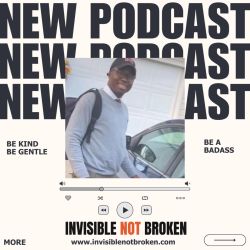
Disability Access in the Education System and How to Support Disabled Folks’ Needs with Nick Clemmons
54:05|Monica Michelle is joined by consultant and podcast host Nick Clemmons.Nick lives with Sickle Cell Disease.In this episode, Monica and Nick discuss:The ways disabled folks are often forgotten in education infrastructureHow Nick navigates societal limitations to achieve his goalsDisability representation in the mediaKnowing how to realistically offer help to disabled folksTIMESTAMPS00:42 - ADA, Title IX, and disability access in schools20:08 - How Nick makes and achieves opportunities 28:40 - Media and disability40:42 - How to respectfully be concerned about someone else’s needsThe full transcript and all links mentioned can be found on the episode page on invisiblenotbroken.com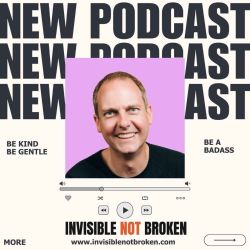
Vulnerability, Resiliency, and Advocacy with Tim Reitsma
47:06|Monica Michelle is joined by consultant and podcast host Tim Reitma.Tim lives with Crohn's Disease.In this episode, Monica and Tim discuss: Tim’s resiliency through managing his Crohn’sThe importance of self-advocacy, especially in the workplace Tim’s podcast why he shares stories of those with invisible illness TIMESTAMPS00:47 - Tim's diagnosis 06:31 - How and why Tim applies self advocacy15:41 - Why Tim started his podcast22:42 - Invisible condition etiquette31:00 - What HR can do better for employees with invisible illness39:31 - Tools Tim uses to care for his Crohn’s outside the homeThe full transcript and all links mentioned can be found on the episode page on invisiblenotbroken.com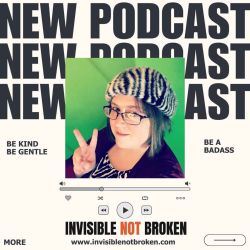
Tech and Disability: What VR Offers the Disabled Community with Sunny Ammerman
01:10:27|Monica Michelle is joined by artist and disability advocate Sunny AmmermanSunny lives with Septo-optic dysplasia, panhypopituitarism, Optic Nerve Hypoplasia, and is missing a membrane in the brain called the "septum pellucidum".In this episode, Monica and Sunny discuss: Sunny’s complex disorders and how she copes with themEverything VR provides from accessible gaming, social platforms and the potential for better online education.Various VR/AR games and their gameplay Sunny’s VR support groupTIMESTAMPS00:45 - What VR/AR offers for chronically ill and disabled folks11:57 - Sunny’s conditions and how she copes with them17:55 - Features that make VR games accessible or inaccessible as well as different games and their play experiences37:13 - The social aspects of virtual gaming51:32 - What opportunities VR has for the future1:04:49 - Sunny’s VR support group The full transcript and all links mentioned can be found on the episode page on invisiblenotbroken.com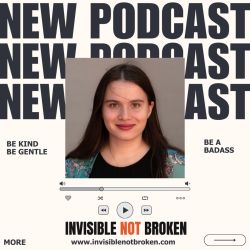
Reporting on Chronic Illness and Disability with Journalist Julia Metraux
39:16|Monica Michelle is joined by Journalist Julia Metraux.Julia lives with vasculitis, mild to moderate hearing loss, and has experienced long COVID.In this episode, Monica and Julia discuss: Julia's diagnosis with vasculitis and how it influences her journalistic lensHow community impacts the mental health of those with chronic illnessHow Julia and Monica find positives and negatives in the internet spaces for chronically ill and disabled folksThe politics of how government, businesses, and celebrities influence the chronic illness community TIMESTAMPS00:32 - Julia's diagnostic journey07:02 - Julia’s work reporting on the online community of chronic illness 16:32 - The effect of Internet communities on chronically ill and disabled folks26:46 - How Julia’s illness impacts her work, both in what she writes about and how she manages her lifestyleThe full transcript and all links mentioned can be found on the episode page on invisiblenotbroken.com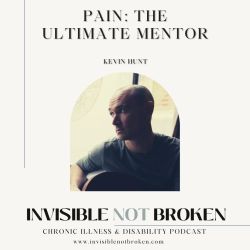
Author of “Pain: The Ultimate Mentor,” Physiotherapist Kevin Hunt
31:29|Monica Michelle is joined by author & physiotherapist Kevin Hunt.Kevin lives with chronic pain.In this episode, Monica and Kevin discuss: Kevin’s philosophy of pain management as a physiotherapist who experiences chronic pain. The Hexagon Model, a life-management tool for focusing on what’s important to you.Kevin’s idea behind his new book.Using pain as a guide.TIMESTAMPS00:34 - Kevin’s work as a physiotherapist specializing in the experience of pain 06:44 - The Hexagon Model for managing your life’s needs14:00 - Putting aside the idea of a “quick fix”19:45 - Kevin’s personal experience with pain and how he uses it with patients28:44 - Kevin’s book, “Pain: The Ultimate Mentor”The full transcript and all links mentioned can be found on the episode page on invisiblenotbroken.com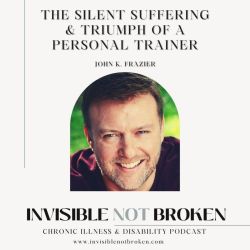
Author of “Through the Pain: The Silent Suffering & Triumph of a Personal Trainer”: John K. Frazier
28:35|Monica Michelle is joined by author & personal trainer John K. Frazier.John lives with ankylosing spondylitis.In this episode, Monica and John discuss: John’s work as a physical trainer and authorChronic pain comparisonsPersonal triumphTIMESTAMPS00:50 - John’s business & diagnosis07:19 - Chronic pain olympics09:31 - Talking about & hiding a diagnosis15:09 - Personal triumph18:24 - Staying in the present23:29 - The superman complexThe full transcript and all links mentioned can be found on the episode page on invisiblenotbroken.com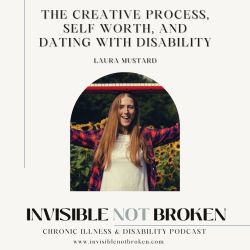
The Creative Process, Self Worth, and Dating with Disability: Laura Mustard
31:08|Monica Michelle is joined by musician Laura Mustard.Laura lives with VATER syndrome.In this episode, Monica and Laura discuss: Laura’s inspiration for her upcoming musical EP.How Laura’s illness impacted her recent relationship & self-image.Laura’s creative process, new music, and social media pressure.TIMESTAMPS00:30 - Laura’s new EP / Monica’s recent COVID experience05:32 - Relationships with chronic illness11:20 - Image and self acceptance with disability15:32 - Laura’s creative process and current projects20:05 - Pursuing creativity despite social media attentionThe full transcript and all links mentioned can be found on the episode page on invisiblenotbroken.com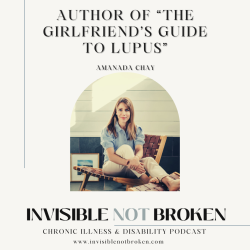
Author of “The Girlfriend’s Guide to Lupus”: Amanda Chay
30:43|Monica Michelle is joined by author Amanda Chay.Amanda lives with Sjögren’s and Lupus.In this episode, Monica and Amanda discuss: Amanda’s book & diagnosisOutlooking on work & writingNavigating chronic illness with kids & familyTIMESTAMPS00:26 - Intro + The Girlfriend’s Guide to Lupus02:17 - Amanda’s diagnosis10:09 - Amanda’s outlook on writing17:11 - Navigating chronic illness with kids & family23:29 - Labels and roles26:24 - Flare reads & closing remarksThe full transcript and all links mentioned can be found on the episode page on invisiblenotbroken.com